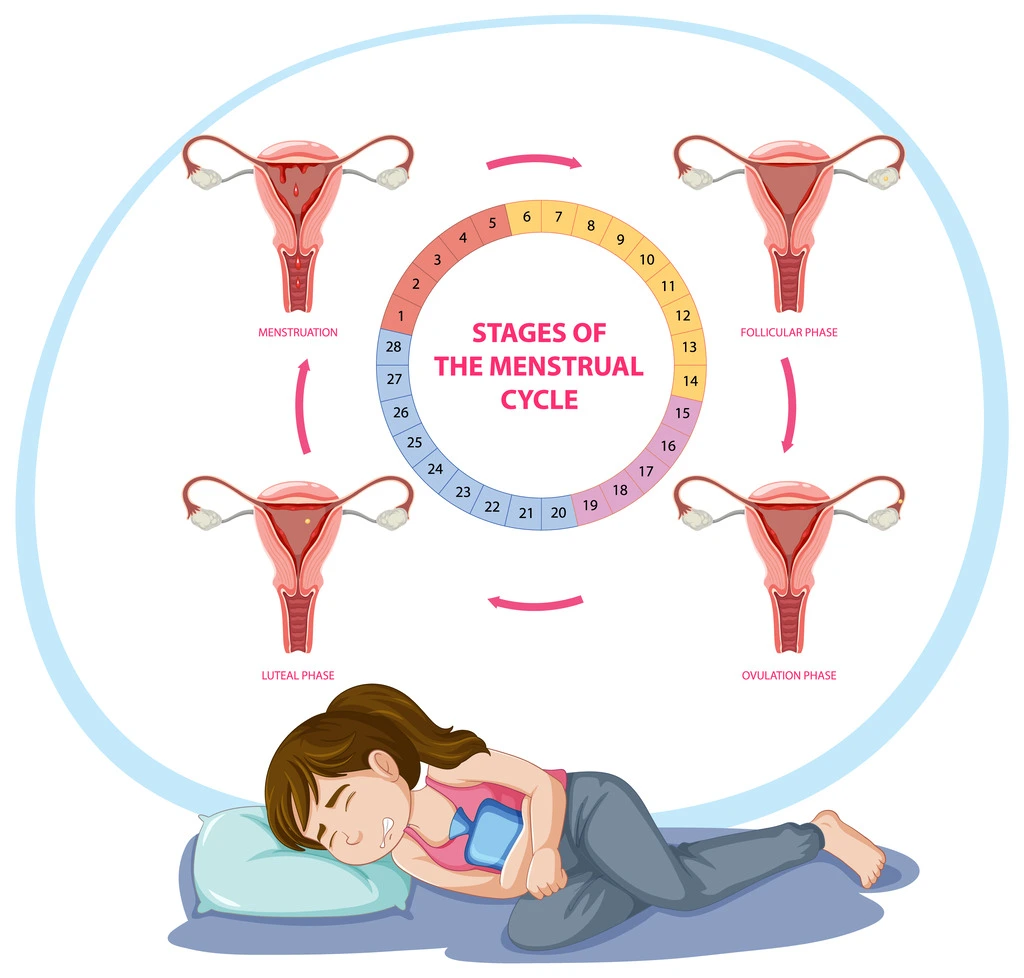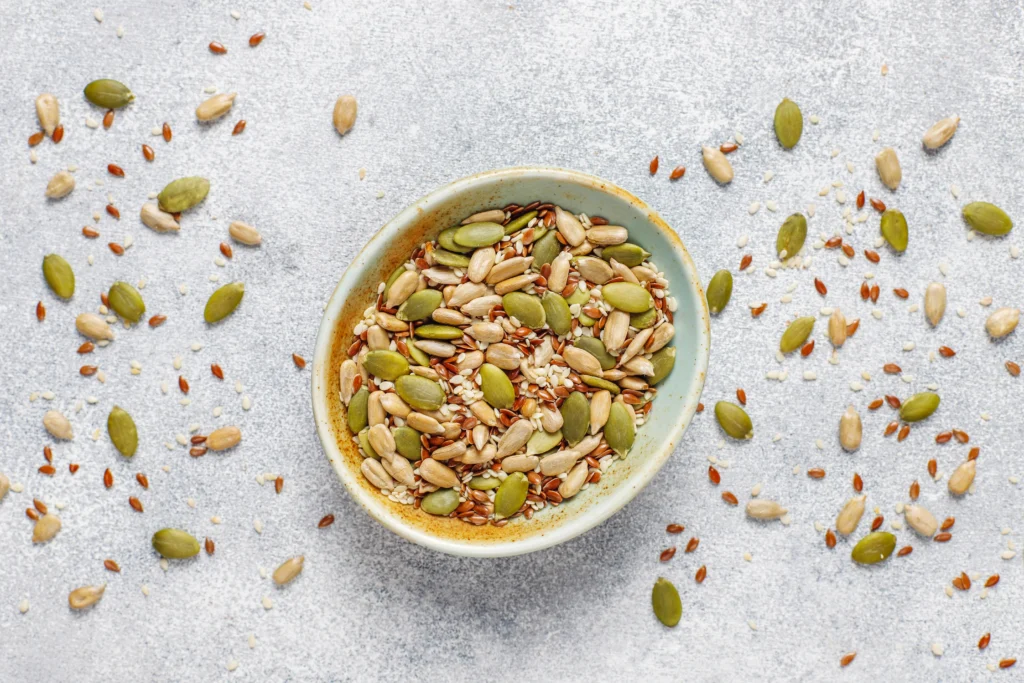Table of Contents
As women approach the menopausal transition, they often find themselves navigating a complex web of hormonal changes, physical symptoms, and emotional ups and downs. The fluctuations in estrogen, progesterone, and other key hormones can leave many feeling overwhelmed, frustrated, and seeking effective ways to find relief.
Seed cycling – a natural, holistic approach that has been gaining traction as a potential solution for managing menopausal symptoms and restoring hormonal balance.
But what exactly is seed cycling, and how can it help women weather the storms of menopause?
In this post, we’ll dive deep into the science behind seed cycling, explore its practical applications for managing menopausal symptoms, and provide insights from both medical experts and women who have experienced the benefits firsthand. By the end, you’ll have a solid understanding of whether this natural approach could be the missing piece in your journey through menopause.
The Science Behind Seed Cycling

At its core, seed cycling is the practice of consuming specific types of seeds in a cyclical manner, aligning with the phases of the menstrual cycle. However, during the menopausal transition, when the menstrual cycle becomes irregular or ceases altogether, the seed cycling protocol is typically adjusted to follow the lunar cycle instead.
The theory behind seed cycling is that the different seeds contain nutrients and compounds that can support the body’s natural hormone production and metabolism, ultimately helping to balance estrogen and progesterone levels. By strategically incorporating these seeds into your diet, you may be able to alleviate a variety of menopausal symptoms, from hot flashes and night sweats to mood swings and irregular periods.
Let’s take a closer look at the two main phases of seed cycling and the specific seeds that are recommended:

Follicular Phase (New Moon to Full Moon)
During this phase, the body is preparing to ovulate, and estrogen levels are typically rising. The recommended seeds for this phase are:
- Flaxseeds: Rich in lignans, which can help regulate estrogen metabolism and provide anti-inflammatory benefits.
- Pumpkin seeds: High in zinc, which is essential for progesterone production and can help reduce hot flashes and night sweats.
Luteal Phase (Full Moon to New Moon)
In this phase, progesterone levels are typically higher, and the body is preparing for a potential pregnancy. The recommended seeds for this phase are:
- Sunflower seeds: Contain selenium, which supports progesterone production and can help alleviate PMS-like symptoms.
- Sesame seeds: Rich in lignans that can help balance estrogen levels and promote a healthy menstrual cycle.
By cycling through these different seeds, you’re essentially providing your body with a steady supply of the nutrients it needs to maintain hormonal equilibrium. The lunar cycle is used as a guide during the menopausal transition because it mimics the natural rhythm of the menstrual cycle, which can help the body adapt to the changing hormonal landscape.
Seed Cycling in Action
- Potential Benefits for Menopausal Women
As women navigate the menopausal transition, they often face a wide range of physical, emotional, and cognitive symptoms. Seed cycling has been explored as a natural approach to managing these challenges, and the potential benefits are quite remarkable.
- Regulating Hormone Levels:
One of the primary benefits of seed cycling is its ability to help regulate the production and metabolism of key hormones, such as estrogen and progesterone. By providing the body with the necessary nutrients, seed cycling may support the natural hormonal balance, potentially reducing the severity of menopausal symptoms.
- Alleviating Hot Flashes and Night Sweats:
Hot flashes and night sweats are among the most common and disruptive menopausal symptoms. The lignans and zinc found in the recommended seeds for seed cycling have been shown to help mitigate the frequency and intensity of these episodes, providing much-needed relief.
- Improving Mood and Reducing Anxiety:
The hormonal fluctuations associated with menopause can take a significant toll on a woman’s emotional well-being, leading to mood swings, irritability, and increased anxiety. Seed cycling may help regulate serotonin and other neurotransmitters, potentially improving mood and reducing the severity of these emotional symptoms.
- Balancing Irregular Periods:
As women approach menopause, their menstrual cycles often become irregular, with some experiencing longer or shorter periods, heavier or lighter flow, and more frequent or infrequent occurrences. Seed cycling may help stabilize the menstrual cycle, promoting more regular and manageable periods.
- Supporting Bone Health:
Decreased estrogen production during menopause can lead to a loss of bone density, increasing the risk of osteoporosis. The nutrients found in the seeds used in seed cycling, particularly the high levels of calcium, magnesium, and zinc, may help support bone health and reduce the risk of fractures.
- Enhancing Sleep Quality:
Menopausal women often struggle with insomnia, disrupted sleep patterns, and poor sleep quality due to the hormonal changes they are experiencing. The potential stress-reducing and sleep-promoting benefits of seed cycling may help improve sleep quality and duration.
- Boosting Energy and Cognitive Function:
The hormonal imbalances associated with menopause can also lead to fatigue, brain fog, and difficulty concentrating. The nutrients found in the seeds used in seed cycling, such as omega-3 fatty acids and antioxidants, may help enhance energy levels and cognitive function.
While the research on the specific benefits of seed cycling for menopausal women is still emerging, the existing evidence suggests that this natural approach may be a valuable tool in managing the multifaceted challenges of the menopausal transition. By tapping into the power of these nutrient-dense seeds, women may be able to alleviate a wide range of symptoms and support their overall health and well-being during this transformative phase of life.
Implementing Seed Cycling
A Step-by-Step Guide
If you’re intrigued by the potential benefits of seed cycling and are considering incorporating it into your menopausal management routine, here’s a step-by-step guide to help you get started:
Establish a Baseline:
Before beginning the seed cycling protocol, it’s important to understand your current hormonal status and any existing symptoms. Consider tracking your menstrual cycle (if applicable), monitoring hot flashes, mood changes, and other menopausal symptoms, and potentially consulting with your healthcare provider for a comprehensive hormonal assessment.
Determine Your Seed Cycling Phase:
If you’re still experiencing a regular menstrual cycle, you can align your seed cycling with the phases of your cycle. If your cycle has become irregular or has ceased altogether, you can use the lunar cycle as a guide, with the new moon representing the start of the follicular phase and the full moon marking the start of the luteal phase.
Gather Your Seeds:
Ensure that you have a supply of the recommended seeds for each phase: flaxseeds and pumpkin seeds for the follicular phase, and sunflower seeds and sesame seeds for the luteal phase.
Prepare and Consume the Seeds:
Aim to consume 1-2 tablespoons of the recommended seeds per day, either whole, ground, or incorporated into your meals and snacks. You can experiment with different ways of incorporating the seeds, such as sprinkling them on salads, adding them to smoothies, or baking them into breads and muffins.
Maintain Consistency:
Stick to the seed cycling protocol consistently, cycling through the different seeds every two weeks (or as per the lunar cycle during menopause). Consistency is key for maximizing the potential benefits of this approach.
Monitor and Adjust:
Pay attention to how your body responds to the seed cycling protocol. If you notice improvements in your menopausal symptoms, great! If not, you may need to adjust the quantity of seeds or the timing of the phases. Be patient and flexible, as it may take some time for your body to respond.
Seek Support and Guidance:
Consider consulting with a healthcare professional, such as a naturopathic doctor, functional medicine practitioner, or registered dietitian, who can provide personalized guidance and support as you navigate the seed cycling process. They can help you optimize the protocol based on your unique hormonal profile and health needs.
Remembering to Stay Consistent and Patient
It’s important to note that the benefits of seed cycling may not be immediate. Like any natural approach, it can take time for the body to respond and adjust to the changes. Be patient, consistent, and persistent in your seed cycling efforts, as it may take several menstrual cycles (or lunar cycles during menopause) to see the full effects.
Additionally, seed cycling should not be viewed as a one-size-fits-all solution. Each woman’s hormonal landscape and menopausal experience is unique, so the effectiveness of seed cycling may vary. It’s crucial to listen to your body, track your symptoms, and be willing to make adjustments to the protocol as needed.
Q.How long does it typically take to see results from seed cycling?
A.The timeline for seeing results can vary, but most women report noticeable improvements in their menopausal symptoms within 2-3 menstrual (or lunar) cycles of consistent seed cycling. Some may see changes more quickly, while others may require a longer commitment to the protocol.
Q.Can seed cycling be combined with other menopausal treatments?
A.Yes, seed cycling can be safely combined with other menopausal treatments, such as hormone replacement therapy, herbal remedies, or lifestyle modifications. In fact, the synergistic effects of these approaches may enhance the overall benefits for managing menopausal symptoms.
Q.Are there any potential side effects or contraindications with seed cycling?
A.Seed cycling is generally well-tolerated, but some individuals may experience minor digestive discomfort, such as bloating or gas, when first incorporating the seeds. Additionally, it’s crucial to be mindful of any allergies or sensitivities you may have to the recommended seeds. While seed cycling is generally safe, individuals may experience minor digestive issues when starting. It’s important to consult a healthcare professional, especially if you have medical conditions or take medications, to ensure the approach is suitable for your needs.
Q.Can seed cycling help with weight management during menopause?
A.While seed cycling may not directly address weight gain associated with menopause, the potential hormonal balancing effects and general health benefits of this approach may indirectly support weight management. However, a comprehensive lifestyle strategy, including diet and exercise, is typically necessary for effective weight management during the menopausal transition.
Q.Is seed cycling suitable for women who have had a hysterectomy or are post-menopausal?
A.Yes, seed cycling can still be beneficial for women who have had a hysterectomy or are already post-menopausal. In these cases, the protocol is typically adjusted to follow the lunar cycle, as the menstrual cycle is no longer a reliable guide.
Remember, if you have any specific concerns or questions about seed cycling and its suitability for your individual health needs, it’s always best to consult with a qualified healthcare professional.
Disclaimer
The information provided in this blog post is for educational and informational purposes only and should not be considered as a substitute for professional medical advice, diagnosis, or treatment. Always consult with a qualified healthcare provider before making any significant changes to your health and wellness routine, including the use of seed cycling or other natural approaches.
The potential benefits of seed cycling discussed in this post are based on emerging research and anecdotal evidence, and individual results may vary. The author and publisher make no guarantees or warranties, express or implied, regarding the effectiveness of seed cycling or any other natural remedies in managing menopausal symptoms or other health conditions.
It is the responsibility of the reader to carefully evaluate the information provided and to seek the guidance of a healthcare professional before implementing any new health or wellness practices. The author and publisher shall not be held liable for any adverse effects or consequences resulting from the use of the information presented in this blog post.



